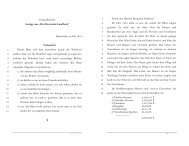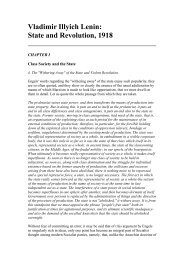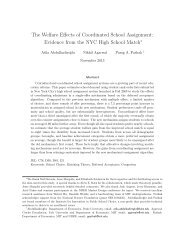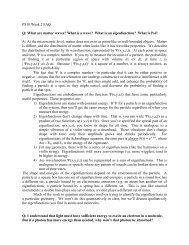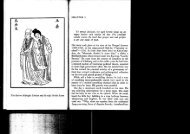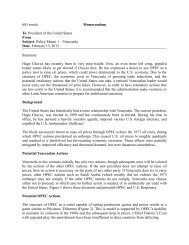What Did You Do in the War, Mutti? Courageous Women ... - iSites
What Did You Do in the War, Mutti? Courageous Women ... - iSites
What Did You Do in the War, Mutti? Courageous Women ... - iSites
You also want an ePaper? Increase the reach of your titles
YUMPU automatically turns print PDFs into web optimized ePapers that Google loves.
582 Robert G. Moeller<br />
prisoner-of-war camps. 40 Chancellor Konrad Adenauer l<strong>in</strong>ked <strong>the</strong> same past<br />
to <strong>the</strong> present when he argued for German rearmament by evok<strong>in</strong>g <strong>the</strong> spectre<br />
of ‘<strong>the</strong> women and men, deported to serve <strong>in</strong> slavery [<strong>in</strong> <strong>the</strong> Soviet Union]<br />
... and what Soviet Russia committed aga<strong>in</strong>st poor defenceless men and<br />
women when it advanced <strong>in</strong>to Germany’ <strong>in</strong> <strong>the</strong> spr<strong>in</strong>g of 1945. 41 KMG told<br />
<strong>the</strong> same story. At <strong>the</strong> end of <strong>the</strong> film, <strong>the</strong> general sends <strong>Do</strong>rnberg on one<br />
more impossible mission, but viewers did not need Rothfels or Adenauer<br />
to rem<strong>in</strong>d <strong>the</strong>m that, <strong>in</strong> March 1945, delay<strong>in</strong>g <strong>the</strong> Soviet advance was <strong>the</strong><br />
only way to ensure <strong>the</strong> evacuation of <strong>the</strong> largest possible number of<br />
Germans. When <strong>the</strong> general hears that <strong>the</strong> ‘Russian has broken through,’<br />
he knows what he has to do. He and <strong>Do</strong>rnberg are protect<strong>in</strong>g Germans,<br />
not follow<strong>in</strong>g orders from Berl<strong>in</strong>.<br />
At <strong>the</strong> beg<strong>in</strong>n<strong>in</strong>g of <strong>the</strong> film, <strong>the</strong> chaotic scene at <strong>the</strong> tra<strong>in</strong> station is filled<br />
with Germans who are do<strong>in</strong>g everyth<strong>in</strong>g <strong>the</strong>y can to escape, and as <strong>the</strong><br />
women proceed to <strong>the</strong> front, <strong>the</strong>y pass signs of Germans <strong>in</strong> flight from <strong>the</strong><br />
Red Army—abandoned suitcases, overturned cars, <strong>the</strong> detritus of a<br />
panicked rush westward. Some eight million citizens of <strong>the</strong> Federal Republic<br />
had fled or been forced from <strong>the</strong>ir homes <strong>in</strong> eastern Europe at <strong>the</strong> war’s end<br />
and could offer variations of this story. Most West Germans could also<br />
recall that <strong>the</strong> end of <strong>the</strong> war <strong>in</strong> <strong>the</strong> east was accompanied by massive waves<br />
of <strong>the</strong> rape of German women by Red Army soldiers, and <strong>in</strong> popular memories<br />
of <strong>the</strong> war’s end, no occurrence is mentioned more frequently. 42 Thus,<br />
<strong>Do</strong>rnberg learns from <strong>the</strong> mo<strong>the</strong>rs, but when he returns to <strong>the</strong> front at <strong>the</strong><br />
end of <strong>the</strong> film, he is also off to defend <strong>the</strong>ir virtue. Even <strong>in</strong> <strong>the</strong> sanitized version<br />
of <strong>the</strong> film, dest<strong>in</strong>ed for domestic consumption, <strong>the</strong> ultimate fate of <strong>the</strong><br />
boys and <strong>the</strong>ir mo<strong>the</strong>rs rema<strong>in</strong>s uncerta<strong>in</strong>. Most viewers would have agreed<br />
with Rothfels that <strong>the</strong>ir survival depended on <strong>Do</strong>rnberg’s cont<strong>in</strong>ued will<strong>in</strong>gness<br />
to defend <strong>the</strong> Heimat and hold off <strong>the</strong> Red Army.<br />
KMG communicated <strong>the</strong> reassur<strong>in</strong>g message that those Germans who<br />
took off <strong>the</strong> uniform <strong>in</strong> 1945 were not crazed Nazis. They had fought<br />
because <strong>the</strong>y had to and because <strong>the</strong>y sought to protect <strong>the</strong> Heimat from<br />
a communist <strong>in</strong>vasion. KMG asked no one to question whe<strong>the</strong>r, ten years<br />
later, West German men should be ready to take up arms aga<strong>in</strong>st <strong>the</strong> same<br />
enemy, if need be. Interviewed dur<strong>in</strong>g <strong>the</strong> mak<strong>in</strong>g of <strong>the</strong> film, <strong>the</strong> director<br />
Laslo Benedek commented, ‘this is no anti-militaristic movie. But it is a<br />
movie aga<strong>in</strong>st war.’ 43 Noth<strong>in</strong>g <strong>in</strong> <strong>the</strong> film suggests that a strong army—<br />
headed by men who listen to mo<strong>the</strong>rs, who can shed tears for lost comrades,<br />
40 Moeller, <strong>War</strong> Stories, pp. 88 122.<br />
41 VDB, [1.] Wahlperiode, 190. Sitzung, 7 Feb. 1952, p. 8098.<br />
42 Moeller, <strong>War</strong> Stories, pp. 65 7; Elizabeth He<strong>in</strong>eman, ‘The Hour of <strong>the</strong> Woman: Memories of<br />
Germany’s ‘‘Crisis Years’’ and West German National Identity’, American Historical Review, 101<br />
(1996), pp. 354 95.<br />
43 Ernst von der Decken, ‘Benedek dreht morgen’.





